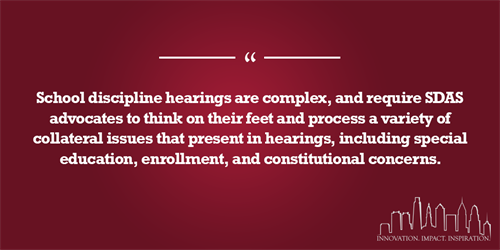Ed. note: Temple Law School has always been “home” to passionate students who don’t wait for graduation to use their advocacy skills in service to the community. The School Discipline Advocacy Service, or SDAS, is one way these students have found to make an impact now. We checked in with 2L Rachel Broder, SDAS Program Director, for an update on their work taking on the school-to-prison pipeline and how the organization has grown since its creation in 2010.
TLS: What is the School Discipline Advocacy Service?
RB: The School Discipline Advocacy Service (SDAS) is a coalition of law students, housed at Temple University Beasley School of Law, working to stem the school-to-prison pipeline by advocating on behalf of students and parents at school disciplinary hearings. Advocates work in small teams to interview, prepare, and then advocate on behalf of clients at their discipline hearings. Each year, SDAS leadership, in partnership with law school faculty advisors and the Education Law Center (ELC), trains new law student advocates to carry on the organization’s mission.
TLS: What does advocacy look like in this context?
RB: Each case requires a tremendous commitment from law student advocates. First, the SDAS intake team conducts a preliminary interview with those who call the SDAS hotline. The intake team determines whether SDAS may assume representation and identifies key issues and problems that are relayed to the assigned advocates. Once SDAS assumes an advocacy role, the intake team assigns law student advocates to the case-an experienced, senior advocate and a junior advocate, looking to gain SDAS experience. The advocacy team assumes all client communication and accompanies the client to the school discipline hearing, if necessary.

TLS: What do the advocates do at the school discipline hearings?
RB: At hearings, SDAS advocates may direct a student-client’s testimony, cross examine school witnesses, and present recommendations, where appropriate. Due to the informal nature of school discipline hearings, SDAS advocates think creatively about the best ways to advocate within the nuances of a school discipline hearing and exercise skill in doing so, even under pressure from school district officials. Thus, while informal, school discipline hearings are complex, and require SDAS advocates to think on their feet and process a variety of collateral issues that present in hearings, including special education, enrollment, and constitutional concerns. Client representation ends after the school discipline decision is made; however, where collateral issues present, SDAS strives to refer its clients to legal partners like ELC who may be able to assist.
TLS: How did SDAS get started?
RB: SDAS’ history dates to 2010-11, when a group of Temple Law School students banded together in response to the climate of “zero tolerance” surrounding Philadelphia’s public schools. Looking to models in New York City and New Orleans, the students created “Students for Students,” an organization that would represent children in disciplinary hearings, provide know-your-rights training in the community, and develop a network of partners to assist in resisting zero tolerance practices. With the help of a grant from the Good Works section of the American Bar Association Section on Litigation, Students for Students (later renamed SDAS) trained dozens of law students to carry out its mission.
TLS: What else has changed besides the name?
RB: In its first year, SDAS handled about ten cases. Last year (2013-14), SDAS received sixty calls and provided direct advocacy at thirty-five hearings. With assistance from the national Dignity in Schools Campaign (DSC), SDAS extended its services to support students in Philadelphia public charter schools and held a symposium that brought together practitioners from the education, social work, and legal sectors to discuss charter school discipline.
This year, SDAS has received over 40 calls. As of January 26th, SDAS has already provided direct advocacy at 25 hearings, with two upcoming hearings. SDAS has seen enormous growth, not only in case numbers, but on an organizational level. SDAS trained 60 new advocates this fall, received another grant from DSC, and partnered with The Sheller Center. We continue to welcome new partners from both the academic and professional communities. Additionally, SDAS was interviewed by The Notebook on current discipline policies ( http://thenotebook.org/december-2014/147974/philadelphias-shift-discipline-policy). Finally, SDAS has grown such that it is now able to contribute to policy work in the school discipline realm. Working with lawyers and advocates from ELC, DOJ, The Arc, and DSC. SDAS now regularly shares its learned knowledge about the discipline process in Philadelphia.
TLS: Why did you get involved with SDAS? How has it contributed to your personal and professional development?
RB: I completed two years of service with City Year before coming to law school. I wanted to stay involved in the community and SDAS was a natural avenue. SDAS has allowed me (and all other advocates) to develop a variety of advocacy skills, including: client interviewing, client preparation, articulating a “closing,” examining witnesses, and most importantly, empowering clients to tell their own story. SDAS advocates practice the skills taught to us in law school, but also learn what it is to be engaged members of the community.
To learn more about SDAS, please visit their website at http://www.sdasphiladelphia.com/.
